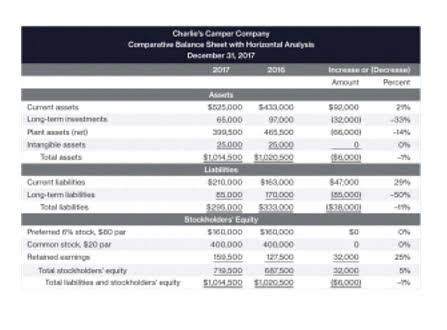
This promotes a more flexible and responsive business model by strengthening staff collaboration, increasing productivity and enabling accountants to provide customers with real-time information. By considering these qualities when choosing a business accountant, you can ensure that you find the right professional to help drive the financial success of your business. Look for the right mix of professionals that you will need depending on the stage/size of your business. I also recommend finding peer groups with other business owners. Start with a few key performance indicators, or KPIs, that really matter to your business type and build from there. Discover how accounting is on the brink of positive disruption and what accountants and bookkeepers can do to be successful.
- Similarly, the Journal of Accountancy published an article providing examples of the impact of robotic process automation (RPA) on tax practices and processes.
- With full, consistent, and accurate records, it enables users to assess the performance of a company over a period of time.
- Effective accounting identifies opportunities, optimizes resource allocation, and supports long-term planning, ensuring the organization thrives in a competitive market.
- In the long run, having an accountant review your contracts can save you from potential disputes or financial pitfalls.
- Technology is the flipside of the accounting coin in today’s world.
W9 Form Basics: Essential Guide To Understanding Taxpayer Identification
Their insights support long-term planning and sustainable strategies, helping businesses thrive in competitive markets. The remote CFO is a relatively new concept where accountants can work with business owners remotely and on a part-time basis. They can help to manage cash flow, create forecasts and budgets, prepare financial reports, set goals, and help business owners make well-informed decisions. Partnering with an accountant can transform your small business, providing you with the expertise and support needed to thrive in today’s competitive market. Whether it’s managing day-to-day finances or https://www.bookstime.com/articles/bookkeeping-for-medium-sized-business planning for future growth, accountants are key players in your business’s success. Accountants serve as trusted advisors, working closely with management, investors, and other stakeholders to ensure the smooth functioning and growth of the company.
Guide business succession planning

They conduct comprehensive financial analyses and review operational processes to identify inefficiencies and potential areas for improvement. By implementing financial controls and streamlining processes, an accountant helps businesses optimize their financial performance how is sales tax calculated and maximize profitability. Accountants ensure that small businesses comply with all relevant tax laws and regulations.

Accounting for Small Business vs. Enterprise
They carefully track transactions, check accounts often, and follow accounting standards. Benefits of accounting include following tax laws and regulations. Accounting helps create trust and credibility, especially for businesses. It is important to have accurate financial statements that follow accounting standards. This practice can help in getting loans, attracting investors, and meeting regulatory requirements. A good accounting system promotes transparency, accountability and improves business efficiency.
- One of the easiest ways to keep your expenses low and increase your bottom line is by outsourcing some of your workloads.
- Our survey demonstrates clearly the need for compliance knowledge – 79% of accountants agreed that regulations from government, industry, and international bodies are forcing changes to working practices.
- In the United States, people often use rules that are called generally accepted accounting principles, or GAAP.
- From tracking expenses to complying with tax laws, the financial side of business requires precision and expertise.

Whether you’re just starting or managing a growing enterprise, understanding the role of an accountant is key to maximizing efficiency, minimizing risks, and ensuring sustainable growth. This article dives into the various ways accountants empower small businesses, from handling day-to-day bookkeeping to offering strategic financial advice. In conclusion, accountants are indispensable partners in the pursuit of business success. From strategic financial planning to risk management, financial analysis, and tax optimization, their contributions are multifaceted and invaluable.

Accountants play a crucial role in the success and longevity of a business by providing essential financial insights, which help in strategic decision-making. Their expertise in what are three ways accountants help businesses thrive? managing financial records, preparing budgets, and ensuring compliance with regulatory requirements enables businesses to operate efficiently and avoid costly mistakes. By facilitating financial transparency, accountants enable business owners to make informed choices that foster growth and sustainability. Moreover, accountants are adept at identifying cost-saving opportunities and optimizing financial performance.
- By fostering a proactive approach to financial management, accountants enable companies to sustain growth and thrive in a dynamic environment.
- COVID-19 has shaken most companies and overnight has changed the way business owners are looking at their expenses.
- Accountants set up and manage these systems, helping you stay organized and streamline your financial processes.
- Accounting helps create trust and credibility, especially for businesses.
- Some well-known options are Oracle NetSuite, SAP Business One, and Microsoft Dynamics 365.
Next, consider the industry you work in and any laws that apply to it. It’s a great compromise for the business owner who prefers to do what they do best—be an entrepreneur and grow their business—instead of toiling over the day-to-day minutiae of running the business. Accountants bring financial information to lifeSuppose your data is just ‘sitting’ somewhere in the database, and you are not analysing, interpreting or using it to help meet your business objectives. In that case, you are probably missing out on some best opportunities. An accountant on hand will act as your go-to person when it comes to understanding tax rules as they stand up-to-date on changes and will make sure you get maximum benefits.
- In this enlightening interview, Roger sits down with Stacey Chillemi to break down the core elements of accounting and why it’s so much more than just taxes and bookkeeping.
- Through careful analysis of financial data, accountants identify trends, inefficiencies, and untapped opportunities.
- A professional accountant is always up-to-date on tax laws and regulations.
- Yet, many may not realise the role they can play in improving the lives of these owners and employees throughout the year, not only when it’s time to meet a compliance deadline.
- Accountants take on many important roles within small businesses.
- Even if you think you are many years away from retirement or selling out, knowing the value of your business today is important so you can plan for the future you want to have.
Key metrics to measure to optimise accounts payable efficiency
At the heart of any well-run business is accurate bookkeeping. Accountants record and organize all financial transactions, including sales, purchases, payroll, and operating expenses. By maintaining detailed and up-to-date financial records, they provide small businesses with a clear picture of their financial health. Different business structures, such as sole proprietorships, partnerships, or corporations, have different accounting requirements and tax implications.